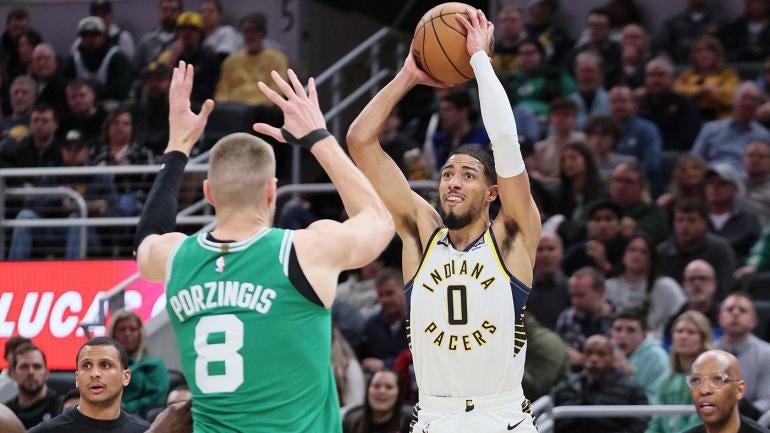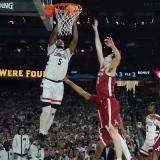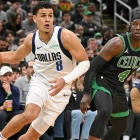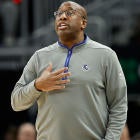
Let's be honest about the Eastern Conference finals: Nobody reading this expects the Indiana Pacers to beat the Boston Celtics. All six CBS Sports predictors chose the Celtics, and nobody predicted that the series would go seven games. Take a look around the internet and you'll find mostly similar predictions.
In one corner sits a 64-win team that has reached the Eastern Conference finals in six of the past eight seasons. In the other sits a 47-win team in its first playoff run as a group that needed significant opposing injuries in the first two rounds just to get here. The series line to open things up is Celtics -900. That line represents implied odds of 90% in Boston's favor.
But if Vegas picked winners, we wouldn't have to play the actual games. Upsets happen, especially to the Celtics. Boston has lost as a favorite in three of the past four postseasons. Last spring, they blew their chance at the NBA Finals to the No. 8-seeded Miami Heat. These Pacers, by basically any quantitative measure, are better than that Heat team was. There is a scenario, however unlikely, in which Indiana beats Boston.
So let's game this out. Even if we don't actually expect it to happen, let's attempt to figure out what exactly an Indiana upset would look like.
Pray to the shooting gods
There are plenty of reasons not to challenge the Celtics to a shootout. Boston led the NBA in 3-point attempts and came just a hair shy of leading the league in percentage as well. They made 140 more 3-pointers than any other team this season and came 12 shy of making more than any team in history. More importantly, they did that without a single player finishing in the top seven in the NBA in terms of made 3-pointers. Jayson Tatum ranked eighth with 229. He was the only Celtic in the top 20. Boston just became the first team in NBA history in which every rostered player made a 3-pointer. Everyone on the roster can shoot.
Of course, the same is true for Indiana. The Pacers just had the best shooting playoff game in NBA history, but even over the greater season-long sample, the Pacers ranked ninth in 3-point percentage. More importantly, 3-point shooting introduces the important element of variance. When one team is significantly better than the other on paper, the underdog's best tactic is to create a game as subject to randomness as possible.
If both teams are firing up a steady stream of 3-pointers, the more the outcome becomes subjected to luck. You don't need to outshoot the best shooting team in the NBA 82 times. You just need to do it four times out of seven. That's well within the bounds of random chance. Caleb Martin can attest to that. He shot 18 of 35 from deep against the Celtics in last year's Eastern Conference finals after entering the series as a relatively low-volume 36% career shooter.
But more importantly, 3-pointers are the shots Indiana is designed to defend. No team is more intentional about the shots it allows than the Pacers. Indiana opponents averaged only 29.3 3-point attempts per game last season, more than two full 3's fewer than any other team. The other end of that spectrum is that no team allowed more than Indiana's 29.9 shots in the restricted area per game.
Boston, usually for better, but occasionally for worse, is a team built to win or lose by the jumper. The moment the Celtics realize how easily they can get to the basket in this series is the moment that they win it. But if Indiana can get them to keep shooting from deep, they've at least left open the possibility that Boston misses more shots than usual. They might get swept in a barrage of triples, but there's no good strategy against a team as dominant as the Celtics. We're looking for the least bad option.
Dictate tempo, and with it, ball control
This is another potentially counterintuitive strategy in an upset attempt. Typically, underdogs are best served by slowing the game down. This is, again, a variance issue. The more possessions available to a favorite, the more chances it has to exert its superiority.
But tempo is Indiana's entire playing style. The Pacers ranked No. 2 in the NBA in pace during the regular season, and they just managed to exert their pace on the NBA's slowest team, the New York Knicks, in the second round. Playoff games, especially as we get deeper into the postseason, are never going to be the sort of track meets that you might see in, say, December or January, but that doesn't mean tempo is irrelevant.
The Pacers are used to playing fast. Other teams, including the Celtics, who rank No. 19 in pace, are not. This matters more than anything from a ball-control perspective. No team turned the ball over less often this season than the Celtics. Of course, as we know, the Celtics (specifically, Jaylen Brown) have developed a bit of a turnover problem in high-leverage moments over the past few postseason. Perhaps they've truly gotten over that weakness. But Indiana pressured Jalen Brunson full-court quite often in the Knicks series, and they're likely going to do the same at points in this one. When the Pacers knocked the Celtics out of the In-Season Tournament, they did so by winning the turnover battle by a +13 margin. Turnovers help the Pacers stick to their own fast pace and get the sort of easy shots they can't always generate in the half-court.
Indiana probably isn't going to win the rebounding battle in this series. The Celtics have been the best rebounding team of the postseason so far and ranked fifth in the league in regular-season rebounding rate. The Knicks nearly won their second-round series over the Pacers largely by killing them on the glass. If the Pacers can't even out the shot attempts margin with turnovers, they're going to find themselves at an immediate mathematical deficit against a superior opponent. That's not exactly an upset recipe. Indiana's goal needs to be turning this into a fast, frantic series. Make the Celtics play their way, not the other way around.
Hope for a limited Kristaps Porzingis
Nobody roots for injuries, but the reality for Indiana is that the series is significantly more winnable if Kristaps Porzingis doesn't play in it. The expectation, for now, is that Porzingis will miss at least Games 1 and 2. There appears to be optimism that he could return as the series progresses, but calf injuries are tricky. Even if he makes it back, there's no guarantee that he returns at 100%.
Porzingis is important for a number of reasons. He obviously fits Boston's five-out offense to a tee, firing 3's further from the basket than any other big man in basketball. His rim protection is essential as well, especially against a team as small as the Pacers. There just isn't much Andrew Nembhard or T.J. McConnell can do to sneak a layup past someone with a 7-foot-6 wingspan. If nothing else, every minute Porzingis plays is one that reserves like Luke Kornet and Sam Hauser don't have to. Boston doesn't want to stretch Al Horford too far.
But really, Porzingis was acquired for this exact moment. It's right around this point in the calendar every year that the offense finds a way to short-circuit. The turnovers go up. The shot selection stops making sense. The scheme flies out the window. This is where Porzingis is at his most valuable. When your offense sputters as Boston's tends to late in the postseason, it really, really helps to have a 7-2 jump-shooter whose looks can't really be contested. He can calm an offense down with easy points because there aren't many defenders that can really make scoring hard for him.
That's a weapon Boston doesn't have at the moment. With Horford at center, the Celtics are as vulnerable to what happened last year against the Heat or two years ago against the Warriors as ever. They're still justifiably heavy favorites in this series. They might even be favored in the next one. But they got Porzingis to fix their offense in late May and June. No matter how they got here, it's the Pacers opposing them in late May, and Boston's preferred solution isn't on the court. As long as that's the case, Indiana's odds are meaningfully higher.






















